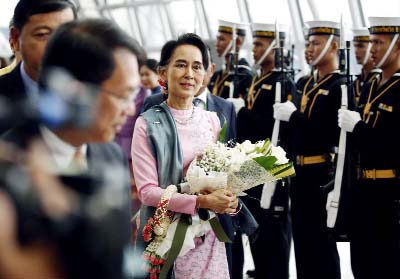
AP, Bangkok :When Myanmar’s Aung San Suu Kyi last visited Thailand four years ago, it was as head of her country’s opposition party to offer moral support to the huge numbers of her countrymen who work here as migrant laborers in menial jobs, often in exploitative conditions. She arrived back on Thursday as her country’s elected de facto leader to tackle on an official basis the problems faced by Myanmar migrant workers the government estimates to number 1.4 million but advocates say is at least twice that.In her new position of more power and responsibility, Suu Kyi faces greater scrutiny than she did as a democracy heroine fighting military rule. The trip puts her in the spotlight as questions have arisen about her government’s policies, particularly toward the oppressed Rohingya Muslim minority, which critics say fall short of what they expected from the Nobel Peace Prize laureate.A highlight of Suu Kyi’s three-day visit is a town hall-type meeting Thursday with Myanmar migrant workers in the Thai port of Mahachai, where many work, reprising a similar meeting in 2012 that drew tens of thousands.She is expected to sign an agreement Friday with the Thai labor ministry that will slash a “work break” required after four years of labor in Thailand, from three years to 30 days. The three-year requirement means many Myanmar migrant workers would rather stay illegally in Thailand than return home to bleak job prospects for such a long period.”In 2012, she gave a promise to the workers … that she would support them, both to return to Myanmar but also to have a better life here,” said Andy Hall, who advises the Migrant Workers Rights Network. “I think the workers see her visit, both as something that would result in greater protection for them, but also (as) another sign that the time is coming when they can eventually go back home to their motherland and continue their lives there.”Suu Kyi was scheduled to visit a refugee camp in the western province of Ratchaburi, bordering Myanmar, but that was canceled due to poor weather, the Thai foreign ministry said.There are about 100,000 refugees from Myanmar in camps just inside the Thai border, and their eventual repatriation has been discussed for decades. But combat in Myanmar’s ethnic-controlled border regions has never completely ceased, though there are hopes that with the army out of power, peace can be achieved.Suu Kyi’s 2012 visit was her first trip abroad in 24 years, with much of that time spent under house arrest under Myanmar’s then-military government. She was freed after a 2010 election – boycotted by her National League for Democracy party – installed a military-backed government.Her party swept last year’s general election to take power in March, but she is blocked from becoming president because of a constitutional clause that bars anyone with a foreign spouse or child from holding the job. Her two sons are British, as was her late husband. Instead, her party created the post of state counsellor, putting her in charge of her amenable party colleague, President Htin Kyaw. She also is foreign minister.Suu Kyi, who won her Nobel prize for her nonviolent promotion of democracy, is being hosted by Thailand’s markedly undemocratic military junta, and her trip is being tightly scripted, with no chance for the media to question to her, even at a joint media appearance Friday with Thai Prime Minister General Prayuth Chan-ocha, where organizers say a joint statement will be read.One issue overshadowing her visit – even if she isn’t directly asked about it – is her government’s treatment of the Rohingya, a Muslim minority of about 1 million who generally have been deprived of citizenship under Myanmar law and are targets of discrimination and violence.Many in the country’s Buddhist majority, who typically call them “Bengalis,” say the Rohingya are mostly illegal immigrants and not a native ethnic group, although many have lived in Myanmar for generations.

